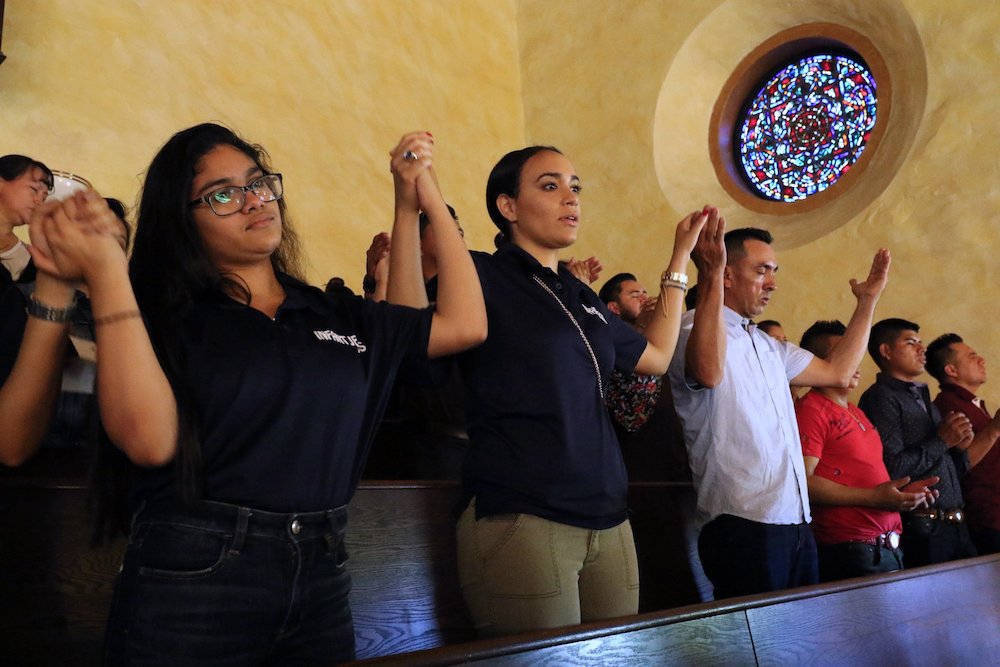
Latino Catholics recite the Lord's Prayer during Mass at the Labor Day Encuentro gathering at Immaculate Conception Seminary in Huntington, New York, Sept. 3, 2018. Pope Francis told students and faculty at Rome's Pontifical Latin American College Nov. 20, 2020, that the presence of Latin Americans around the world has enriched the Catholic Church with a renewed zeal for the Gospel. (CNS/Long Island Catholic/Gregory A. Shemitz)
After missing out on high school proms and college graduations and grappling with the deaths of more than 500,000 Americans, including loved ones, young Catholics believe there will never be a return to "normal" in a post-pandemic world.
And that's OK, especially for young Latinos, who say they had not previously been able to fully integrate their activism with their faith. Latinos across the United States were hit hard by COVID-19, as many lost loved ones and jobs.
The pandemic, combined with the racial reckoning of last summer, has young Catholics — and those who minister to them — thinking about what the church can learn from Generation Z. Gen Z generally includes people born from about 1995 to 2010 — people roughly 11 to 26 years old.
Activism is "not a hobby," for Arlin Téllez Martínez, a junior at Trinity University in Washington, D.C. During the pandemic, she committed to housing justice and fought on behalf of community members in danger of eviction.
"Our communities have been hit hard this past year; we will still need space to grieve," explained Téllez Martínez.
But she hopes faith leaders will continue to create safe spaces where young Catholics can grapple with all the traumas of the past year while still being open to their leadership in responding to injustice after the pandemic.
Diversity, equity and inclusion are essential for post-pandemic ministry to young people, said Josh Packard, executive director of Springtide Research Institute, which researches the relationship between young people and religious leaders. "That is important as a baseline for getting Gen Z to fully participate in your organization," he said.
Milton Javier Bravo, a theology professor at St. John's University in New York, agrees and stresses that any conversation of post-pandemic ministry in the Catholic Church must be done through the lens of Latino Catholicism.
"We are the protagonists of the Catholic Church in the United States, and that has to be palpable in the leadership and the liturgies," said Bravo.
Sixty percent of Catholics under 18 in the United States are Latino.
Bravo suggests incorporating Latinx art and ritual practices as a way to minister to young Catholics and center the community's worship traditions.
Advertisement
In a study and report offering advice for ministering to young people after the pandemic, the Minnesota-based Springtide Research Institute suggests that faith leaders can help young people understand how to best deal with stress; use art as a form of expression; and "rebuild the metaphorical vocabulary of collective religious and spiritual expression by focusing on tangible, concrete steps" forward.
Reaching young people in the post-pandemic world means "reimagining what's possible and what's needed as young people process the past year and look forward to what's next," according to the report, "The New Normal: 8 Ways to Care for Gen Z in a Post-Pandemic World."
The report surveyed 2,500 young people ages 13-25 a year after the start of the COVID-19.
Packard believes faith leaders can help young people navigate these uncertain times in a way that other professional adults can't, but they must be innovative.
"If religious leaders walk in after the pandemic thinking what we're doing is getting you to make a lifelong commitment to my God, you're going to go backward. The data is so crystal clear that's not going to work," Packard stresses.
In a moment where young people have been severely impacted by the pandemic, Springtide hopes the new study can better equip religious leaders to respond to the needs of young people during this time. The report also states that faith leaders in youth ministry must focus on "rebuilding trust, understanding where young people are at, and exercising empathy."
"If religious leaders walk in after the pandemic thinking what we're doing is getting you to make a lifelong commitment to my God, you're going to go backward. The data is so crystal clear that's not going to work."
—Josh Packard
As a former campus minister at Loyola Marymount University in Los Angeles, John Paul Ramírez watched students struggle during the pandemic. "People who were juniors when this all started have now spent the last half of their college experience totally online," he explained.
For many students, their senior year of college is often marked by an immersion trip or service oriented activity, opportunities that allow many students to immerse themselves in different cultures and encounter those living on the margins. The pandemic has deprived many of these experiences, Ramirez said.
Instead, campus ministry offered virtual speakers and events, but he wasn't able to always connect with as many students.

Courtney Shropshire and Carissa Brailsford, students at Sacred Heart University in Fairfield, Connecticut, work on a Habitat for Humanity house in Columbus, Georgia, March 13, 2009, while on spring break. For many students, college includes an immersion trip or service oriented activity — not so during the coronavirus pandemic. (CNS/Courtesy of Sacred Heart University)
Jazmin Navato, a 23-year-old Latina Catholic based in Santa Maria, California, has missed the community and togetherness of her parish, where she was an altar server.
But she expressed some optimism that the pandemic-included isolation strengthened her faith. "Since we have not been able to gather together in person, this past year has allowed me to reflect and grow in my own personal spirituality, instead of performing religiosity at Mass," said Navato. Yet she still misses "the space where we share our joy and our troubles." She hopes that Catholic faith leaders will create new spaces where all feel welcome and safe.
Packard hopes that faith leaders who use the report will remember that it will take extra work to reach out to people who have been removed from their communities this last year.
While the pandemic has changed many things, according to Packard, one thing it has not is young people's belief in God. "Religious leaders won't find themselves talking to 13-25 year olds that don't care what they have to say," he said.
For many, "The New Normal" report offers a hopeful blueprint on how to intentionally minister to young Latino Catholics in a post-pandemic world, including those who are often overlooked in ministry.
"We don't want to be a burden," said Téllez Martínez, the junior at Trinity, "but we also need to know we don't have to do this all by ourselves."







